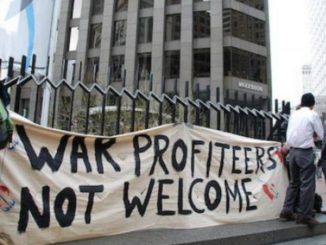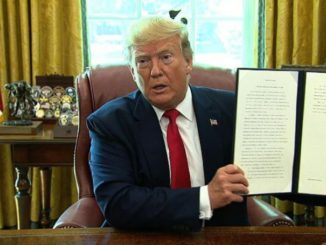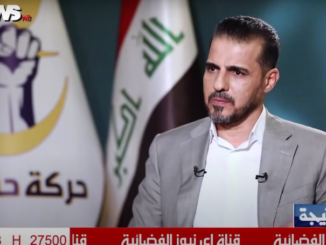Reviewed by Ludwig Watzal – Bonn, Germany
(William T. Hathaway, Radical Peace. People Refusing War, Trine Day LLC, Waterville, OR 2012, 170 pp.)
US President Barack Obama promised his fellow Americans peace. His humanitarian rhetoric impressed everybody around the globe. That is why he received the Nobel Peace Prize for nothing after one year in office. But the disappointment came on the foot. The “savior” turned out to be a warrior. The rhetoric was beefed up. The aggressive but clumsy rhetoric of the George W. Bush administration was replaced by smart newspeak. The war did not stop but has been continuing more intelligent and smartly till today and will go on indefinitely because the greed of the US Empire for hegemony is unquenchable. The Obama government has to secure oil supplies, pipeline routes and the privileges of the oil companies and the Military Industrial Financial Complex. The indigenous population in the devastated countries like Afghanistan, Iraq, and Libya don’t matter. What counts is that respective countries function as US gas stations (Saudi Arabia plus the United Arab Emirates) and warehouses for raw materials.
William T. Hathaway is fed up with the US Empire’s military aggressive juggernaut and of the lies that the corporate media has set before the American people. “These betrayals of democracy make it clear our government doesn’t really represent us but rather the business interests.“ (2) As a former Special Forces soldier he turned peace activist and became a political journalist. He writes for newspapers, magazines and progressive website and is the author of “A World of Hurt”, “CD-Ring”, and “Summer Snow”. He is an adjunct professor of American studies at the University of Oldenburg, Germany. But even in Germany, the book earned him worse.
“I was in the Special Forces in Panama and Vietnam. I’d joined the Green Berets to write a book about war. During our search-and-destroy operations, I kept telling myself, ‘I’m just here gathering material for a novel.’ But our deeds have consequences that affect us and others regardless of why we do them. I’m still dealing with the repercussions from my involvement, and my work in the military resistance movement is a way of atoning for it.” (10)
The book is a cry of despair of peace activists who are seeking new ways to confront state power and stop this killing machine. These people see no sense in demonstrations or petitions, instead, they choose direct actions, defying the government’s laws and confronting its capacity to wage war. By doing that, each of them is trying to throw sand in the wheels of aggressive undertakings by the different US governments. This book portrays “unusual efforts” by activists asking: “How can I help end war?” Each of these approaches differs from one another and the activists do not necessarily agree with every one of them, but all think that their story is worth to be told. Some stories are written by the activists directly, while others are in form of interviews, which were conducted by the author. To protect the activists from governments’ repression or even prosecution, Hathaway has decided to keep their real names a secret. Most of the people involved in this peace project are considered “criminals” because they “violate that travesty of American freedom, the Patriot Act”. (3) Because the author lives outside the “homeland” he published under his real-name.
In the book, the real war heroes are those who desert or quit the military and join the resistance movement against war. One guy was Rick who was “abducted” by peace activists, while he was collecting garbage with his comrades. “No one’s going to kill him, and he’s not going to kill anybody.” This was a hairy action. “We broke more laws than usual.” (7) A women called Petra from Pax Christi, the Catholic peace movement, helped Rick. In the US, he had made different plans, studied at the Army’s expense electronics, but after 9/11 the Army needed infantry troops rather than electronic specialists. They gave him an M-16 and flew him to Afghanistan. Over there, he saw the havoc and the killing of civilians caused by the US occupying forces. After eight month his wife divorced him. Rick got severely wounded and was flown out of Afghanistan to a US military hospital in Germany. After his recovery he went AWOL (absent without official leave). Before the group could make arrangements to get him to Sweden, he was arrested for AWOL and put to the detention barracks from where he was finally “abducted”.
A very special disgusting read is the report of a woman-soldier “Larissa”, which she wrote as a “little black Dutch girl” to the author. What she said about her fellow-soldiers explains why the US occupying forces go nowhere in Iraq. But that’s not her main point. She reported on her own ugly rape that was done during the night when she went to the bathroom. She reported this wicked crime to her superiors and had to file a complaint that was turned down because of “lack of evidence”! For her safety, she was transferred to another military camp. Since this incident, her only desire was to get out of this hell. She finally made it to the Netherlands.
How deep-seated the hatred towards the US occupation among young Iraqis is shows the interview with “Merna al-Marjan” who lives in Germany and studies European history. In Iraq, she never wore a headscarf because Iraq under Saddam Hussein was the most secularized and advanced country before the “Bushies” turned it into a battlefield and caused havoc among the people. In the middle of the night, solders broke into their house and killed her brother. “While two soldiers pointed their rifles at us, the others searched us. They made us raise our arms and spread our legs, and then they patted all over our bodies. One of them stuck his hand between my legs and smirked. Another squeezed my mother’s breasts. My brother shouted and lunged at the man, but the Americans grabbed him (…) They pushed my brother to the floor and kicked him in the head and stomach and between his legs. He tried to kick back until one of them put the barrel of his gun to his head. My brother stopped, and they punched him in the face, yanked his arms behind his back, snapped handcuffs on him, and kicked him again, calling him a ‘sand nigger.’ Then they handcuffed my father to keep him from defending us.” (122) Having asked all kinds of stupid questions, they ravaged the house and took her father and brother to an American prison and tortured the brother.
She complains about the distorted view of Arab women and men in the West. “What really makes me mad is when Westerners use the way women live in the Muslim world as a justification for invading it — either with their armies or their ideas. They’re convinced we should be like them. If they were happy, that would be one thing. They could say, ‘Here, follow our example.’ But they’re much unhappier than most of us are. Their marriages and families fall apart; their children commit terrible crimes, commit suicide. Their society is fragmented into these isolated individuals who have to compete against one another. It’s a wreck, but they’re trying to force it onto us.” (118)
She is not at all satisfied with the situation between women and men in Arab societies. ”We definitely have to change the power between men and women. It has to be more equal. We need to make sure men don’t harm women. But we don’t need help from the all-wise Westerners to do that. Their model doesn’t work even for them, so it sure won’t work for us.” (119) She’s not an “extremist” “but that doesn’t matter. The Germans are running on fear now. They try to pretend they’re independent of the Americans, but they’re helping them in all sorts of ways to kill Iraqis and Afghans. And they know that’s going to lead to revenge attacks in their country, so they’re wary now about letting Muslims into Germany. To them, we’re all potential terrorists.” (120)
In the West, al-Qaeda stands for pure terrorism. “Merna al-Marjan” has a different opinion: “Even fanatics like al-Qaeda aren’t really aggressors. They’re fighting a defensive war.” Their demands are never published in Western media. “They basically come down to, ‘Go home and leave us alone. Pull your soldiers, your CIA agents, your missionaries, your corporations out of Muslim territory. If you do that, we’ll stop attacking you.’ Nothing about destroying the West or forcing it to become Islamic. Just that the West should stay in the West.” (120)
The West shouldn’t be surprised that he faces severe resistance in the savaged countries like Afghanistan and Iraq. The infamous “Patriot Act” has turned the United States into a “police state” like many critics say. This “act” has stripped the American people of their basic rights. The book ends with a trialog between the author and his Jewish friends who, after 40 years of marriage, wanted to get a divorce, because they were at odds with the policy of the Bush administration and the policy of the State of Israel! Thanks to Hathaway’s sensitive counseling techniques they are still together.
With the publication of the book, this political chapter is concluded in the author’s life. He has no more direct contact with the other contributors or interviewees in the book. At a certain time of his life, these forms of action were an asset, but it’s political more important to move on to bigger challenges such as the organization of the working class as a counterweight to the absolute power of the state.
The forms of resistance presented in the book are all based on violence or violations of the law. Such a strategy can’t succeed and makes all participants to criminals. No democrat can justify such actions. With such a strategy, this movement would go nowhere. The book is an unusual read.
– Dr. Ludwig Watzal works as a journalist and editor in Bonn, Germany. He runs the bilingual blog “Between the lines”. He contributed this article to PalestineChronicle.com. Contact him at: http://www.watzal.com.







